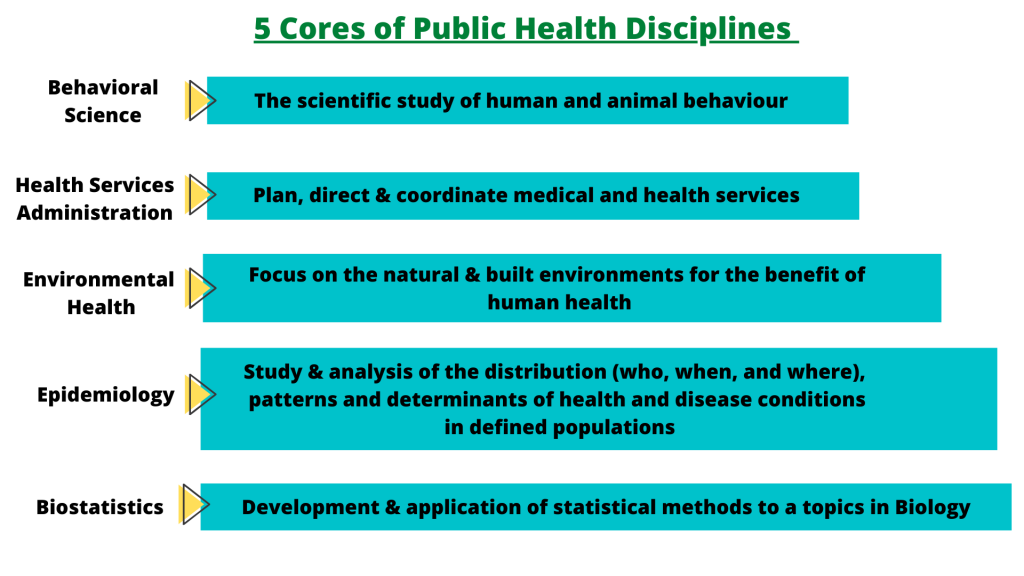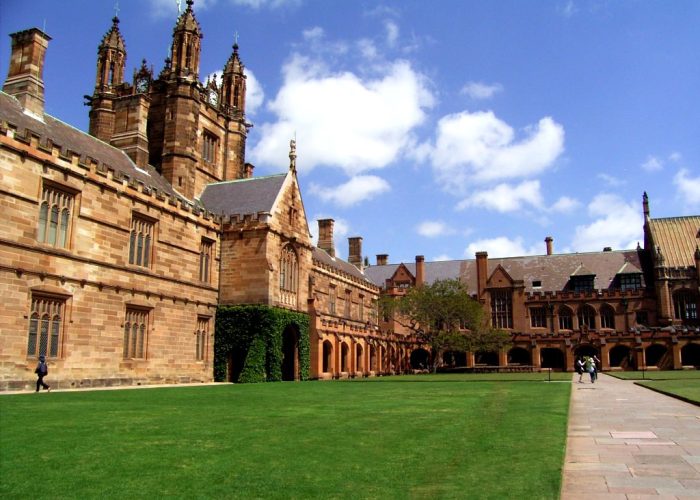You may have heard the term “Public Health” before but uncertain what it is about. It is through the public health industry, millions of people are able to enjoy vaccination programs, restrictions on the use of tobacco, family planning and clean air and water standards. Not only that, the average life expectancy of an individual living in the United States increased by 30 years, thanks to the contribution of public health according to the CDC reports from 1900 to 1999.
You could be interested in this field to pursue your education but not sure whether it is suitable or not for the future.So let us dive in deeper into this field. Lets go!
What is Public Health?
The word ‘health’ may confuse many people because we often relate it to medical settings such as doctors or nurses in hospital. However, public health is not the same as the practice of medicine because Public Health professionals cannot treat patients.
According to the Centres for Disease Control and Prevention, public health is the science of protecting and improving the health of people and their communities. This field is focusing on health care in whole populations, applied research and disease prevention.
What are the Core Disciplines of Public Health?

Why is Public Health Important?
Public Health is both a field of inquiry and arena for action. It engages people from different disciplines who work together to uncover the root causes of complex health problems before developing practical and cost-effective solutions. Public Health staff are not like doctors and nurses, who focus mainly on treating individuals after they become sick. Public Health is important in our society because this field:
- Improve the quality of life for communities and populations by conducting research and disseminate information to the public.
- Combating infant mortality, extending life expectancy and reducing the incidence of communicable diseases.
- Ensure the communities are healthy through child wellness, preventing disease, clean water, access to healthcare and many more.
- Try to prevent problems from happening or recurring through implementing educational programs, recommending policies, administering services and conducting research.
Why should You Study Public Health?
There are so many reasons why you should study Public Health and some of the reasons are:
Graduates are high demand
The job opportunities in this field increased by 11.11% while healthcare and medical industry was among the fastest growing in Australia in 2017, according to Seek research. Therefore, you just not worry about employability because jobs could be either in the public sector or private sector.
Making an impact in the world
You are able to give back to the community. You will be conducting research on how to improve the quality of life in a family, young teenagers and even elderly and thus, protecting and improving the health of the community. Not just that, your findings could be contributing to global health one day. Remember, not all superheroes wear cape, some use their Public Health education!
Excitement
You are able to travel abroad to work in the lab. Your skills will be valued in fields like medicine, veterinary, dental and even social work. The job itself is rewarding but the education process is also interesting and exciting. Not only that, the public health spectrum often changes as new problems arise and thus, you will never feel stagnant or bored.
So, if you think you are interested in this path, check out the traits below to see if you have what it takes before pursuing Public Health:
1. Empathy
You will be doing a lot of visiting to medical facilities. For this, you need to have empathy for the patients especially the children and elderly and those who have been diagnosed with serious health issues. You must strive to see the patients’ side of the situation to ease their anxiety and fears.
2. Friendliness
This trait goes hand-in-hand with empathy. You need to be warm and always have a conversation with the patients. You must not treat them coldly and have no regard to their feelings. Therefore, you must be friendly in nature.
3. Strong Ethical Values
All public health workers must comply with all the ethical standards that are set by each of the countries where you will be working in the future. You need to maintain the ethical standards all the time to ensure effective and efficient healthcare services to patients. Not only that, you need to ensure the patients’ personal and sensitive information is protected by setting standards relating to data storage, retrieval and transfer.
4. Responsibility
You must be able to show up for work on time and on the days that you are scheduled. When public health workers miss work or come late to work, the burden of other staff will be increased and thus lead to job burnout in overworked staff. This line of work will not accept any inferior service no matter the circumstances.
5. Motivation
You must be highly motivated in everything you do either to complete your work, go for a visit, meet the patients or conduct research. This is crucial especially this field is oftenly fast-paced that requires both speedy service and attention to detail.
What are the Career Prospects in Public Health?
Many students continue their Bachelor Degree study to a Master Degree as it promises better employability and higher salary. The career prospects when you pursue the Public Health pathway are:

What are the Entry Requirements to Study Public Health in Australia?
General Entry Requirements for Undergraduate Degree
English: IELTS 6.0
A- Level: 10
STPM: 8
UEC:2
General Entry Requirements for Master Degree
English | IELTS 6.5 |
Undergraduate Degree |
|
The requirements may vary according to different universities. Contact us for other requirements that are not listed above 😃
Now, let us take a look at your potential universities to pursue this path in Australia.
Top Universities to Study Public Health In Australia
The University of Sydney

QS World University Rankings by Subject 2020: Life Sciences & Medicine | 2nd in Australia 24th globally |
Undergraduate Program | Bachelor of Science (Health) |
Intakes | February & August |
Duration | 3 years |
Annual Indicative Fees | AUD $48,500 |
AND
Master Program | Master of Public Health |
Intakes | February & August |
Duration | 1.5 years |
Annual Indicative Fees | AUD$ 49,000 |
University of New South Wales (UNSW)

QS World University Rankings by Subject 2020: Life Sciences & Medicine | 5th in Australia 68th globally |
Undergraduate Program | Bachelor of International Public Health |
Intakes | February & September |
Duration | 3 years |
Annual Indicative Fees | AUD $23,520 |
AND
Master Program | Master of Public Health |
Intakes | February, June & September |
Duration | 1 year |
Annual Indicative Fees | AUD$ 47,280 |
Deakin University

QS World University Rankings by Subject 2020: Life Sciences & Medicine | 10th in Australia 224th globally |
Undergraduate Program | Bachelor of Public Health |
Intakes | July |
Duration | 3 years |
Annual Indicative Fees | AUD $32,000 |
AND
Master Program | Master of Public Health |
Intakes | July |
Duration | 1 year |
Annual Indicative Fees | AUD$ 37,400 |
Griffith University

QS World University Rankings by Subject 2020: Life Sciences & Medicine | 12th in Australia 256th globally |
Undergraduate Program | Bachelor of Public Health |
Intakes | February & October |
Duration | 3 years |
Annual Indicative Fees | AUD $27,500 |
AND
Master Program | Master of Global Public Health |
Intakes | February, July & October |
Duration | 2 years |
Annual Indicative Fees | AUD$ 30,500 |
University of Technology Sydney (UTS)

QS World University Rankings by Subject 2020: Life Sciences & Medicine | 20th in Australia 363rd globally |
Undergraduate Program | Bachelor of Health Science |
Intakes | March |
Duration | 3 years |
Annual Indicative Fees | AUD $31,050 |
AND
Master Program | Master of Public Health |
Intakes | March |
Duration | 1.5 years |
Annual Indicative Fees | AUD$ 26,460 |
Western Sydney University

QS World University Rankings by Subject 2020: Life Sciences & Medicine | 21st in Australia 369th globally |
Undergraduate Program | Bachelor of Health Science (Specialization in Public Health) |
Intakes | March & July |
Duration | 3 years |
Annual Indicative Fees | AUD $26,760 |
AND
Master Program | Master of Public Health |
Intakes | July |
Duration | 2 years |
Annual Indicative Fees | AUD$ 28, 680 |
Edith Cowan University (ECU)

QS World University Rankings 2020 | 31st in Australia Top 700 globally |
Undergraduate Program | Bachelor of Health Science |
Intakes | February & July |
Duration | 3 years |
Annual Indicative Fees | AUD $32,850 |
AND
Master Program | Master of Public Health |
Intakes | February & July |
Duration | 2 years |
Annual Indicative Fees | AUD$ 32,600 |
Did you find this helpful? If so Give us some Feedback! We are always finding news ways to improve. If you want to know more or ask us a question, please feel free to contact us any time!
Contact us to find out more
International Student enquiries:
Phone:+60182414802
Email: [email protected]
For more stories like this, join the Excel Education community on Facebook
Need help with your uni application? Connect with us here

Stephanie Calamba
Part time ACCA student, part time content writer but full time child of God.

